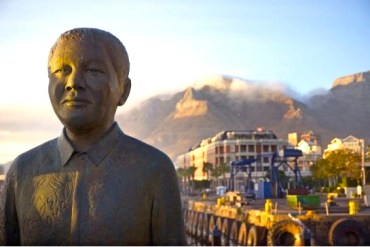
A bust of a youthful Nelson Mandela adorns the famous Victoria & Alfred Waterfront in Capetown, three kilometres from Robben Island. On Thursday, Mandela passed away at age 95. (Julia Pelish/Vacay.ca)
[This article first appeared on Vacay.ca on December 5, 2013, the day Nelson Mandela died.]
Naively, I arrived in South Africa three years ago thinking it would be difficult to find anyone in the nation who didn’t love Nelson Mandela. The first person who I interviewed taught me a lesson. “I didn’t like Mandela much,” said the man, a former diplomat who asked not to be identified when he spoke about his political career. He was present with Mandela at numerous high-level meetings in the 1990s, during the leader’s presidency. “Behind closed doors, he had little tolerance for dissent or opposing views. But I do respect him, tremendously. How could anyone not?”
So, I was asking the wrong question. For all the idolatry around him, Mandela was human and susceptible to the range of emotions as everyone else. Rather than inquiring about the ubiquitous of adoration for him, I should have sought a person in the nation who didn’t appreciate what he did for South Africans of all ethnicities. Such a person I didn’t find; however, somewhere there must exist a dissenter, a boorish individual opposed to the ideas of anti-apartheid and the Rainbow Nation. Largely, though, South Africa is a nation of Mandela acolytes, white, brown, and black.
“It’s like meeting an angel,” Sebastien Qweshe, a driver at the posh Michelangelo Hotel in Johannesburg told me about his encounter with the Nobel laureate.
Maria Sekwane, a member of the African National Congress, remembered February 11, 1990, when Mandela was released after 27 years in prison, as a night of unmatched celebration. “We sang and we danced, but we were also expecting that we would soon have to fight,” she recalled. “For days we were collecting money to buy guns and then Mandela said each and every gun must go into the sea. We couldn’t believe it. But he insisted that had to be the way. That we could not look backward and that had to happen for the country to go forward.”
